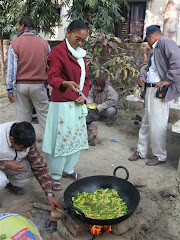A huge storm over the Bay of Bengal on Saturday has brought persistent rain back to the Terai for a week. This has invigorated the mosquitoes and, inappropriately, I spent most of the training day on non-violent discipline trying to swat them. My attempts to ward them off with a raised left eyebrow were unsuccessful, as was the promise of a gold star for not biting me. There were some very interesting observations and discussions about student motivation and (almost) differentiation. I tried very hard to persuade Durga to organise some role play, but have not had much success so far.
David, having attended the 4 day School Self Assessment training has now been in Janapath for 4 days seeing the training put into action. It started slowly, as no-one (apart from David) arrived on time, and the school had not been informed about the nature of the assessment. The head was then faced with the challenge of assembling representatives from the staff, students (relatively easy), and members of the School Management Committee and some parents (less easy). These representative groups are supposed to meet together with a facilitator for 4 days for structured discussion, with the whole group coming together on the last day to agree a School Improvement Plan. An ambitious project, made more difficult as no-one had any prior warning. Women were brought in from the fields to take part in the parents’ group, but did not stay very long as they had to return to feed their cows. After 4 days, during which there had been some interesting and heated debate, the SIP was drafted, but it is not clear what will happen next or who will monitor it. Another document to gather dust.
I went with UNICEF to Sunsari to lead some action research training for primary teachers. A wonderful journey, crammed in the back of the statutory white landcruiser, with a phallic antenna for radar security communication equipment. Radhika and the driver sat in the front wearing UN flack jackets. The field officers in the back were off to do an attendance monitoring exercise in rural schools. The one on whose lap I was perched had done his English language training in Colchester. We left the highway at Duhabi and set off through seemingly endless completely flat brilliantly green rice paddy, irrigation canals, herds of buffalo and small thatched villages. The training was in a long room attached to a guest house, with 25 grade 2 teachers, ranging from men in their fifties to young women with their babies and toddlers, sitting cross-legged on cushions on the floor. Most of the morning was spent playing games and making materials to use in activities when they return to school. Copious buckets of daal bhaat were served for lunch. My task in the afternoon was to introduce them to action research as a way of improving teaching and learning, and they joined enthusiastically in the activities I had prepared and started to develop some very useful ideas. By the end of the day, most of which I had spent cross-legged on the floor, jumping around like a monkey, or singing songs with actions I felt as if I had just done a long yoga session.
I returned to Shankapur on Thursday; to my delight, Rekha has reorganised every classroom in the school, with benches around the room, so she can see all the children, check their books easily, and have a big space in the middle for activities. This is only possible because so many children are absent. She had prepared lessons, brought some resources and wanted me to play an active part. I decided that demonstrating active teaching methods was probably the most effective strategy. I was lucky with the subject matter (photosynthesis); carbon dioxide and oxygen are apparently universal words. Amazing what can be done with a few words of Nepali and a lot of body language. Two teachers went home at ‘tiffin time’, leaving more children without a teacher; it is hardly surprising that attendance is so poor. Rekha persuaded me to take grade 4 for the afternoon for ‘optional English’. I’ve exhausted my repertoire of songs and activities, but I now have time to prepare before my next visit.
The big news of the week was the success of Prasant Tamang in winning the Indian Idol contest. There were spontaneous street parties and fireworks when the results were announced late at night, and celebrating children in the schools the next day. A week of noisy nights, as the bitch in the house opposite is on heat, so all the stray dogs in the neighbourhood congregate to serenade her.
Our vegetarian status has become severely compromised by an unstoppable ant invasion. They are minute and manage to penetrate sealed jars and packets, and are even lively in the fridge. We were amused by the newspaper advertisement for the new buffet at the Radisson in Kathmandu: ‘50% off if 3’ high or under’.
My colleagues (and pension application forms) are beginning to make me feel my age. The spokesman (hesitant English speaker) from the headteachers’ group over glasses of tea in the shed one day: “We are very curious about you. You are so old that we are very surprised that you have come here and are so active”. We’re off to Kathmandu to participate in the marathon next week.
.jpg)
.jpg)







.jpg)
.jpg)
.jpg)
















.jpg)



















